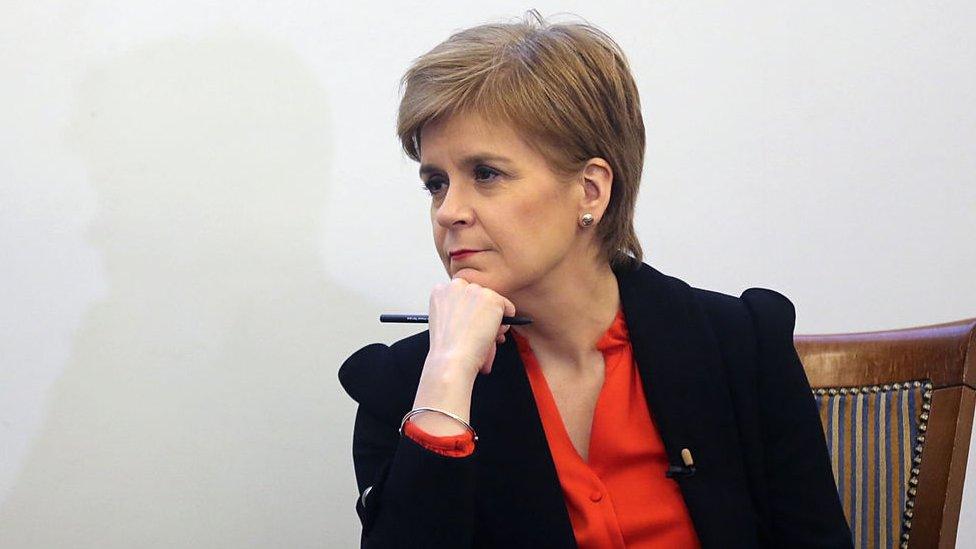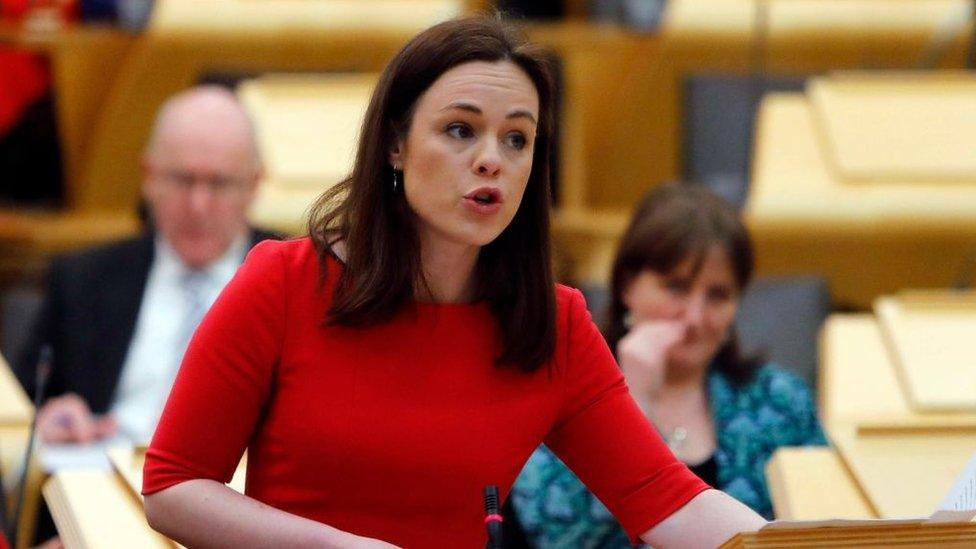What is the Scottish government's guiding philosophy?
- Published

What is the guiding philosophy behind Nicola Sturgeon's government?
Herewith a question which is all too seldom posed in these days of rapid discourse. What is the philosophy underpinning the Scottish government's approach?
I guess that most would reply to the effect that the underlying ambition is independence. However, that is misplaced with regard to the day-to-day working of ministers.
The Scottish government has a declared purpose. Or, more precisely, a Purpose. With a bold capital P.
Now, the more cynical among you may express surprise, familiar as you are with the customary chaos attendant upon contemporary politics.
But there is a guiding philosophy which influences and shapes individual policies and ministerial actions.
This has been upgraded in recent years - and, as is the way with such things, it has been lengthened somewhat, without acquiring any discernible increase in precision.
One should not complain. By definition, mission statements tend to be wordy declarations of broad ambition. Ministers are judged by daily deeds.

The environment has equal weighting with the economy in the government's mission statement
In case you are unfamiliar with the Purpose, here it is, set within a broader National Performance Framework. We are told:
The framework is for all of Scotland. We aim to:
create a more successful country
give opportunities to all people living in Scotland
increase the wellbeing of people living in Scotland
create sustainable and inclusive growth
reduce inequalities and give equal importance to economic, environmental and social progress.
Instantly, of course, you can see the intrinsic challenges. Other than entrenched malcontents, I guess that few would complain about seeking success.
But how do we measure wellbeing? To be fair, the first minister made a significant effort in a recent, thoughtful lecture.
And look at the final section. Are we really to attach equal importance to economic, environmental and social progress?
What if they clash? What if a policy involves discernible, measurable economic growth - but with a claimed environmental cost? Or the other way round?
That, of course, is where the Purpose gives way to individual ministerial decisions. That is where broad ambition cedes the stage to raw politics.

In which regard, another question which is all too rarely pursued. What is the broad economic strategy of the Scottish government?
More precisely, with the budget looming, what is the underlying philosophy with regard to taxation? What is the broad thinking as to the balance of tax?
There, I think, the present administration struggles to some extent, as have previous occupants of Bute and St Andrew's Houses.
Philosophically, one may believe that taxation is state robbery. Alternatively, one may aver that private property is theft from the commonweal. Or one may adhere to sundry positions in between.
In that panoply of opinion, where does the Scottish government sit? Much of its view on such matters is unstated.
How about that objective of growth, carefully calibrated by the adjectives sustainable and inclusive? Is growth best driven by cutting taxes, by lowering the levy upon business, for example?
Or is it best achieved by taking revenue to the centre, and then reapportioning it to projects which benefit society and the economy more generally?
Ministers do not say - at least not as a credo, not in philosophical terms.

Ministers face new decisions as fresh fiscal powers are devolved to Holyrood
Consider the development of tax policy under the SNP in its various administrations. The party was previously in favour of cutting corporation tax by up to 3% in Scotland, in the event that power over this levy were to be transferred to Scotland from the Treasury.
There was talk of matching the tiger economy of Ireland, with its low-tax pitch to global business. The image, always unstated, was of making Scotland the Singapore of the British Isles, rather than the Albania.
This policy was quietly ditched, even without the tax being devolved to Scotland. It was seen as being out of step with the party's variable credentials on the left.
Then there was another tax policy - which was to cut and ultimately abolish the air passenger tax, which was devolved from Westminster in 2017.
To ministerial relief, the policy was held up for years by a row over an exemption for Highlands and Islands Airports. It could not be implemented.
Finally, again, it was dumped. Ultimately, it became evident that it sat ill with the ambition of tackling carbon emissions, with the declaration of a climate emergency.
Arguably, that meant that - for this policy only - greater importance was attached to environmental rather than economic issues. Bearing in mind that the purpose of the proposed cut was to enhance growth in Scotland.
That is not - repeat not - to say that the old policy and/or the new policy are intrinsically right or wrong. It is to question the philosophical driver underpinning these changes.

Air passenger duty remains set at a UK-wide level
This issue of ideological conviction arose to some extent when Holyrood first gained significant income tax powers.
Labour, in particular, pressed for the adoption of a higher top rate of tax. It would, they argue, bring in valuable revenue and send a signal about the priorities of the government, about the choices to be made.
Nicola Sturgeon cited research to the effect that such a move might actually cut revenue if it generated tax avoidance behaviour.
She signalled further - again without being explicit about over-arching philosophy - that she was interested in practicalities, not gestures.
This issue of ethos will be a challenge for new Finance Secretary Kate Forbes, whose nomination as a cabinet secretary will be endorsed by Parliament later today.
It was a challenge for her predecessors, including Derek Mackay, whom she replaced. Mr Mackay reshuffled income tax to benefit those on lower incomes without, he argued, imposing too great a deterrent levy on entrepreneurs and wealth creators.
Further, he acted quietly and without proclamation to lessen the overall burden upon business. Not by giant strides, but mostly by small, cumulative steps.

Kate Forbes was formerly public finance minister, but has now been promoted to the top job
Why not go further? Why not trumpet such steps, limited as they were? Because that would have meant taking, to some extent, an ideological stand.
It would have meant choosing more precise language in a lexicon which, hitherto, was deliberately blurred. Especially in a parliament of minorities, with a proportional voting system and a significant rival on the centre Right, the SNP has avoided ideological purity on tax.
Mr Mackay was also acutely aware, as is the first minister, that nothing must be done - or appear to be done - which, in any way, lessens Scotland's attraction to UK and global investment.
That is why ministers have repeatedly sought ways to stress the limited and balanced nature of their tax structure. But doing so in pragmatic, rather than philosophical terms.
I await with interest the approach to be adopted in this regard by the new cabinet secretary. It may prove a source of innocent merriment.
